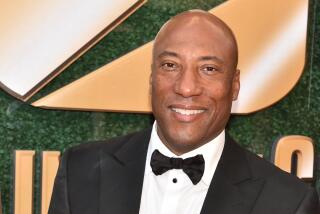Nielsen Meters Faulted in Audit
A confidential audit of a controversial new electronic system being employed by Nielsen Media Research to measure TV-watching habits has found that 1 in 6 viewers was improperly classified as black and 1 in nearly 14 was improperly labeled Hispanic.
An executive summary of the Ernst & Young audit, obtained Monday by The Times, contained a number of other criticisms, including that those using the electronic devices were poorly trained. It also cited high “fault rates” in which the device couldn’t tell what TV programs a viewer was watching or was unable to communicate the information to Nielsen.
Those rates, the audit said, are “averaging several points too high.” The rate for African American viewers showed “a very large disproportionate faulting of 25% or more.”
Although the Ernst & Young audit examined a relatively small pool of minority viewers -- fewer than 40 families in all -- the details are likely to give a boost to critics who argue that Nielsen’s “people meter” system is flawed and doesn’t accurately capture what African Americans and Latinos are watching. In turn, they say, that could unfairly sway decisions made by TV programmers.
The big problem, apparently, isn’t with the technology itself. Rather, it is with the makeup of the sample audience that Nielsen has recruited to use the people meters, which are designed to replace the paper diaries that the company has collected since the 1950s.
Critics have urged Nielsen, a unit of the Dutch publishing firm VNU, to postpone rolling out the new system until the troubles can be fixed and the sample audience is truly reflective of the community being surveyed.
Despite those calls for delay, Nielsen recently introduced the devices in New York and plans to do the same next month in Los Angeles.
The Ernst & Young audit of New York viewers led to a decision last month by a subcommittee of the Media Rating Council -- a group of major network, cable and advertising executives -- to withhold accreditation for the people meters.
Although the council’s vote wasn’t binding, it came as a blow to Nielsen and was swiftly seized on by a coalition of African American and Latino public interest groups called Don’t Count Us Out. The coalition has been trying to pressure Nielsen to back off using the devices.
Its aggressive advertising and public relations campaign is being bankrolled by Rupert Murdoch’s giant News Corp. media conglomerate, whose Fox TV stations could lose millions of dollars in advertising because test runs of the new devices show lower ratings for its stations. The relationship between the unabashedly conservative News Corp. and minority advocates often identified with liberal causes has raised eyebrows in some quarters.
Meanwhile, Univision Communications Inc., Viacom Inc.’s CBS and Los Angeles Times parent and TV station owner Tribune Co. also have called for Nielsen to delay implementation of the people meter system.
Paul Donato, Nielsen’s chief research officer, said the company either had dealt or was dealing with the items raised in the Ernst & Young audit, adding that they did not invalidate the entire system.
“You never get all the bugs out,” Donato said. “These are works in progress. We take this information seriously, and we react to it.”
For one thing, Donato said, Nielsen already has lowered the fault rates. As for classifying viewers by race, Donato said the difficulty stems from how Caribbean Hispanics wish to be identified, an issue with which demographers as well as Nielsen officials are grappling.
According to the report, auditors found that two of 12 families they checked were improperly classified as black, as were two of 27 families considered by Nielsen to be Hispanic. In one case, auditors discovered that a family listed as speaking “mostly Spanish” spoke none; as Brazilians, they speak English and Portuguese.
Ernst & Young also hit Nielsen for inadequately educating families on how to use the new system, with the auditors expressing particular concern about the experience of Nielsen’s staff in this area. Of Nielsen’s coaching of users, the report said: “Needs significant improvement, marginal effectiveness, marginal record-keeping.”
Donato said Nielsen was addressing the criticism.
The report also noted that results from the new technology were sometimes thrown off by interference from cellular phones, TiVo-style digital video recorders, satellite TV systems and digital cable television.
More to Read
Inside the business of entertainment
The Wide Shot brings you news, analysis and insights on everything from streaming wars to production — and what it all means for the future.
You may occasionally receive promotional content from the Los Angeles Times.










